Heineken Cup: Background to the European rugby dispute
- Published

The future of European rugby at the end of the 2013-14 season is in turmoil after a protracted row over who plays in the Heineken Cup, how much they are paid and who runs the competition.
BBC Scrum V looks at the issues and the parties involved in a dispute threatening to tear the game apart.
Background
In June 2012, The French Top 14 and English Premiership Rugby clubs said they intended to withdraw from the Heineken Cup once the current "European Rugby Club (ERC) accord" ran out at the end of the 2013-14 season, unhappy at how teams qualify for the tournament from the RaboDirect Pro12 league and how proceeds are shared.
The top six clubs in England and France are guaranteed a place in the Heineken Cup, whereas at least 10 Pro12 outfits - including both Scottish teams, both Italian teams and a minimum of three sides each from Wales and Ireland - have automatic entry into the competition.
Of the £44m generated by the 2012-2013 Heineken Cup, 52% went to Pro12 clubs while 48% was shared by England and France, who want a three-way split of revenue between the Aviva Premiership, Ligue Nationale de Rugby and Pro12.
ERC is the governing body and organiser of the Heineken Cup and second-tier Amlin Challenge Cup tournaments. Its board, external is dominated by representatives from Six Nations' national governing bodies who outnumber representatives from the French, English and Welsh clubs.
Initially the English and French clubs proposed a new tournament called the Rugby Championship, external Cup to be run by the clubs, and invited Celtic and Italian teams to participate.
But the French clubs announced in November they would participate in a tweaked ERC-run European tournament in 2014-15 - leaving the English clubs apparently isolated.
Who is involved in the dispute?
There are various parties including clubs/regions, leagues, respective unions, ERC, the International Rugby Board and TV companies (BT and BSkyB).
Scrum V Special
The Welsh, Scottish and Irish Rugby Unions had insisted their clubs would not participate in any European competition unless it had the "full approval" of the International Rugby Board (IRB).
However, the IRB has indicated to the BBC it would probably support a new competition if approved by the English and French unions.
What are the implications for RaboDirect Pro12 teams in Wales, Scotland and Ireland?
In Wales, there are worries about keeping players. British and Irish Lions Richard Hibbard, Ian Evans and Jonathan Davies and Leigh Halfpenny all announced transfers out of the Welsh domestic game.
However, 2013 Lions captain Sam Warburton will stay in Wales having becoming the first player to agree a central contract with the Welsh Rugby Union while Alun Wyn Jones opted to stay with the Ospreys.
The four Welsh regions - Blues, Ospreys, Scarlets and Newport Gwent Dragons - are unhappy the new deal for an ERC-run European tournament does not bring in any extra money and are considering joining the English clubs in an Anglo-Welsh tournament from 2014.
They would face being disciplined by the Welsh Rugby Union if they rebelled, and WRU chief executive Roger Lewis has claimed that the RFU would block an Anglo-Welsh tournament.
Their umbrella body - Regional Rugby Wales - has called for a public inquiry into the funding of domestic rugby.
Scrum V's Ross Harries guides us through the issues and personalities involved in the row over the future of the European Cup.
Former Scotland captain Andy Nicol believes professional rugby union in his nation could end if there was no European competition next season.
"I don't think you can fill a hole of that amount with anything else," he said.
There have also been concerns from Ireland, with Leinster chief executive Mick Dawson admitting the province would have to consider entering the new competition if no solution is found.
What are the implications for the TV companies?
BT paid £152m for rights to broadcast English club rugby including their participation in a European tournament. But crucially, the deal excluded the Heineken Cup.
Soon after, ERC signed a four-year extension to its TV deal with Sky Sports.
ERC has accused the English clubs of going back on a binding contract in favour of a "questionable TV deal".
But Premiership Rugby disputes this, and has told the BBC that the TV conflict is a "distraction".
Premiership Rugby believes that as it served notice in June 2012, ERC had no right to negotiate an extension to the current deal after that point.
What is next for the dispute?
The governing bodies in Ireland, Italy, Scotland and Wales plus France have committed to a new Heineken Cup tournament. The English Premiership clubs insist they will not take part.
In Wales the regions failed to agree a new contract binding them to the Welsh Rugby Union's competitions and funding by the end of December 2013.
They have been offered a revised deal by the WRU - called the Rugby Services Agreement - which the regions are currently considering.
However, it is not clear if the new contract satisfies the regions' concerns over finance and they still favour the Rugby Champions' Cup which they claim guarantees an extra £12m in revenue.
In England the RFU claim to be attempting to broker a deal which would see the Heineken Cup administered by the Six Nations Committee instead of ERC.
There appeared to be a breakthrough at a Six Nations meeting in Heathrow on 21 January when it emerged that the six unions were broadly agreed on a new governance model for a future European competition.
With the English Premiership clubs adamant they will not play in a tournament administered by ERC it might offer hope of a resolution.
But if no solution is found, the English clubs claim they could fill a gap left by the Heineken Cup with matches against teams from countries as far apart as South Africa and Wales.
Meanwhile, Scotland and Ireland remain committed to an ERC-run Heineken Cup, as do the Italians.
As yet, no one has come up with a proposal which has succeeded in bringing all the parties around the table together to discuss a possible outcome.
- Published21 November 2013
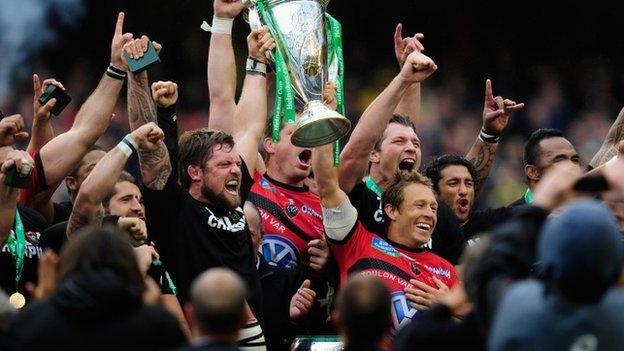
- Published6 October 2013
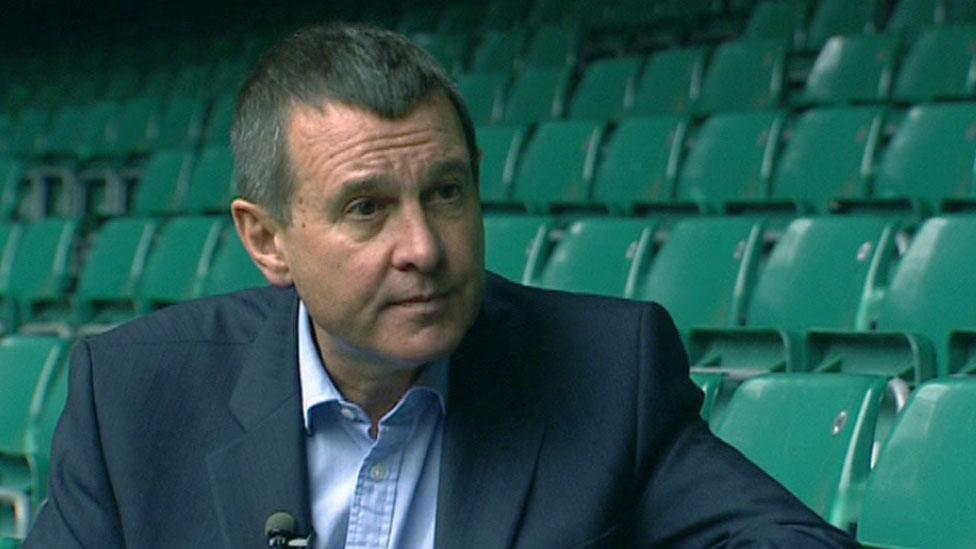
- Published3 October 2013
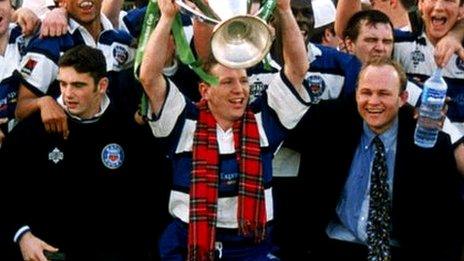
- Published30 September 2013

- Published20 September 2013
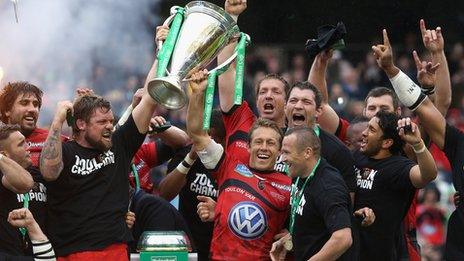
- Published18 September 2013
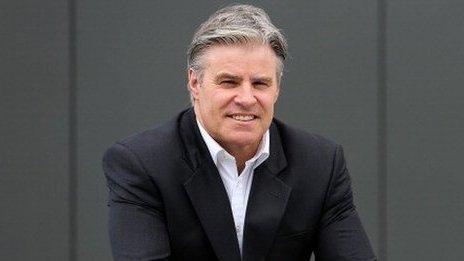
- Published26 September 2013
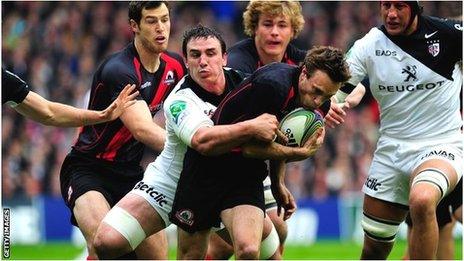
- Published14 September 2016

- Published15 February 2019
